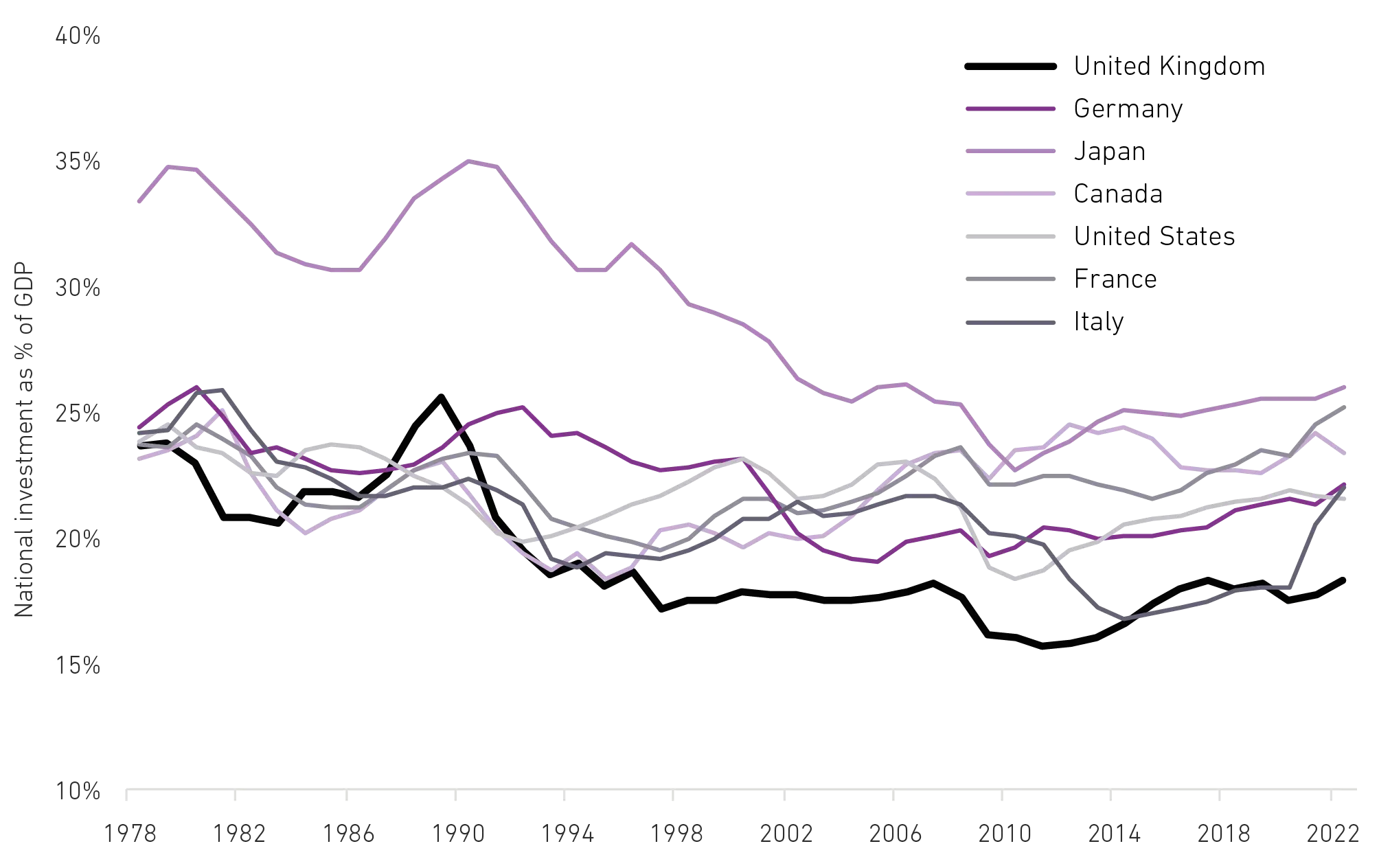
United Kingdom vs. Low Growth: a match we can win!
You’ve heard us say it a million times. Do not worry about UK politics.
And that’s absolutely true… as an investor. Over the long term, with a portfolio which invests around the world, it doesn’t matter who’s behind the door at No. 10 Downing Street.
But look, as a citizen of the UK, there’s a lot to be interested in.
So I thought I’d give a quick take on the challenge/opportunity facing the new government. After all, we do live and vote here – even if our investments don’t!
And hey, who am I to abandon the sports theme… ?
Coaching a country
Get the fans cheering!
That’s your only goal as a new coach of a sports team. Naturally, you’ll set about doing things your way. Changing training patterns to work on certain areas, buying in new equipment and expertise, and shifting the psychology to a winning one.
Now, of course you don’t have an unlimited budget. You can’t upgrade the training facilities, and the medical team, and buy a new defence all at once. So instead, it’s all about focus – choosing where and what to spend, to get the biggest impact as quickly as possible.
Being a new government is similar. Here in the UK, the Labour Party has been chosen to do things a different way, with different people – but ultimately it needs to keep the fans happy.
Even more than in sport, focus is everything. Keir Starmer and his cabinet can’t solve all the problems at once. They need to work out where to direct their resources – what needs to be faced first, and what can be booted out into the next transfer window parliament.
So what’s the goal, and how do we get people cheering for it?
Like most things in the world, your inputs dictate your outputs. Better ingredients mean a better meal. Regular rehearsals result in good opening nights. And proper investment leads to growing economies."
Growth is the goal
The big economic problem that any new UK government is going to have to address is: Lack. Of. Growth.
In the UK, economic wealth per person1 has been basically flat for nearly 20 years. People don’t feel like they’re getting particularly richer or better off, largely because, on average, they haven’t been. In the US, GDP per capita is up by a third in the last two decades…
It’s not just the sluggish bounce-back from Covid. Nor is it all to do with Brexit. And actually, it isn’t even about the 2008 financial crisis (although it didn’t help either).
The big problem has been brewing since before the millennium. Lack. Of. Investment.
Like most things in the world, your inputs dictate your outputs. Better ingredients mean a better meal. Regular rehearsals result in good opening nights. And proper investment leads to growing economies.
Since the mid-1990s, the UK hasn’t been investing anywhere near enough in the basics that lead to growth.
1Technically, GDP per capita. There are no perfect economic statistics, but GDP per capita is a pretty good way of comparing how wealthy the average person in a country is.
Investment as % of GDP

Source: OECD / 7IM
Some of it is obvious, everyday stuff (not even high-tech). Yes, it’s fibre optic cables, but it’s also fixing potholes. But much of it is longer term. The lesson from the chart above is that if you don’t invest now, the effects stick around for three decades.
So the incoming government needs to put in place a system which allows planning, financing and building infrastructure for the next 20 or 30 years.
The problem, of course, is that politicians tend not to like investing in things which they might not be around to take credit for.
Take Nick Clegg’s now infamous 2010 dismissal of new nuclear power because it wouldn’t be around until 2021… Or look at planning reform, or tax legislation, or social care.
The key thing is confidence. Regardless of the project – potholes or power stations – the government’s storytelling has to be confident and personal."
Anything that needs a time-horizon longer than the next election gets sidelined. As Henry Hazlitt, a keen critic of US politicians in the 20th century, said, “Today is already the tomorrow which the bad politician yesterday urged us to ignore.”
So the goal is to put the foundations for growth in place.
Getting the crowd on side
Personally, I think this bad politician, short-term approach doesn’t give enough credit to the UK electorate. More people have patience and tolerance for big projects than we think; just watch any episode of Grand Designs. As long as we support the team, we don’t stop watching when they lose a match – even after all of the years of grief, there’s a majority of popular support in favour of HS22!
The key thing is confidence. Regardless of the project – potholes or power stations – the government’s storytelling has to be confident and personal.
Communication is everything.
Talk about the benefits as well as the costs – and make the updates exciting, modern and honest. Get an engineer to talk through how to build a bridge. Ask a town planner why they picked a roundabout, not traffic lights. A CEO to explain their plans for the
new factory. A county councillor to explain how much of your tax bill goes on a specific project.
Above all, the effort needs to be on local, not national. As in any sport, the most loyal fans are the ones around the corner. The local network effects of our populations are huge. Negativity in a few streets spreads to the whole town – but so does positivity!
We might not ever get to matchday levels of excitement over local roadworks, but that should be the aim!
2https://yougov.co.uk/topics/politics/trackers/support-for-high-speed-rail-hs2
More from 7IM




